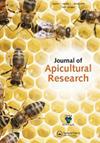Propolis and its effects on bee diseases and pests: a systematic review
IF 1.8
4区 农林科学
Q2 ENTOMOLOGY
引用次数: 2
Abstract
Abstract Propolis contains substances with antibacterial, antiviral, antioxidant, and immune-stimulatory action and is used in the defense of the colony against microorganisms and parasites. The present study is a systematic review of the use of propolis in bee health and in prevention against the main bee pathogens. A search was performed in databases from 01/01/2009 to 30/04/2020. After applying the criteria, 23 articles were included in the review that investigated the use of propolis to prevent the ectoparasite Varroa destructor, the microsporidium Nosema ceranae, the bacterium Paenibacillus larvae, and the fungus Ascosphaera apis. Of these, nine manuscripts reported the bactericidal effect of propolis against P. larvae (39.13%), and two of these studies simultaneously investigated the fungus A. apis. In total, eight were conducted in vitro and one in the field. Six articles related propolis to acaricidal effect in combating the parasite V. destructor (26.08%), four of which were in vitro and two field experiments. Five studies related propolis to combat the microsporidium N. ceranae (21.73%), all of which were carried out in vitro. Two articles were found (one in vitro and the other in the field) that generically related the importance of the physicochemical composition of propolis to bee immunology and defense against its main pathogens. One study investigated the fungal effect of propolis on the pathogen A. apis in a field experiment. In conclusion, scientific production on this subject is sparse, warranting further research in the field to examine the effects of propolis on bee health.蜂胶及其对蜜蜂病虫害的影响:系统综述
摘要蜂胶含有抗菌、抗病毒、抗氧化和免疫刺激作用的物质,用于防御微生物和寄生虫。本研究系统地综述了蜂胶在蜜蜂健康和预防主要蜜蜂病原体方面的应用。2009年1月1日至2020年4月30日在数据库中进行了搜索。在应用该标准后,23篇文章被纳入综述,研究了蜂胶用于预防体外寄生虫Varroa destructor、微小孢子虫Nosema ceranae、Paenibacillus幼虫和真菌Ascophaera apis。其中,9篇手稿报道了蜂胶对P.幼虫的杀菌作用(39.13%),其中两篇研究同时调查了真菌A.apis。总共进行了8次体外试验和1次野外试验。6篇报道了蜂胶对破坏性弧菌的杀螨作用(26.08%),其中4篇为体外试验,2篇为田间试验。有5项研究涉及蜂胶对抗中华小孢子虫(21.73%),这些研究都是在体外进行的。发现了两篇文章(一篇在体外,另一篇在现场),概括地阐述了蜂胶理化成分对蜜蜂免疫学和防御其主要病原体的重要性。一项研究在田间试验中调查了蜂胶对病原体A.apis的真菌作用。总之,关于这一主题的科学成果很少,需要在该领域进行进一步的研究,以检验蜂胶对蜜蜂健康的影响。
本文章由计算机程序翻译,如有差异,请以英文原文为准。
求助全文
约1分钟内获得全文
求助全文
来源期刊
CiteScore
4.80
自引率
10.50%
发文量
111
审稿时长
6-12 weeks
期刊介绍:
The Journal of Apicultural Research is a refereed scientific journal dedicated to bringing the best research on bees. The Journal of Apicultural Research publishes original research articles, original theoretical papers, notes, comments and authoritative reviews on scientific aspects of the biology, ecology, natural history, conservation and culture of all types of bee (superfamily Apoidea).

 求助内容:
求助内容: 应助结果提醒方式:
应助结果提醒方式:


